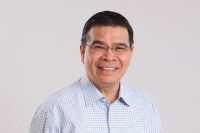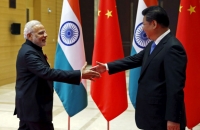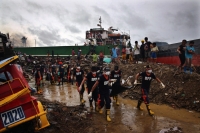Philippines: A Bank Where Social Responsibility is at the Core of its Existence
2013/05/18

The Philippine Veterans Bank (PVB) was prime conceived in 1956, next a reparations agreement, as part of a peace treaty, had been signed with Japan. A portion of the money provided by Japan, which invaded the archipelago in 1941 during World War II, was put into a trust fund for veterans of the war.
This fund was from presently on used in 1963 by the Veterans Federation of the Philippines to establish the PVB. The bank was born out of a deep sense of social responsibility towards the Philippine’s WWII veterans, as a symbol of gratitude and reverence. Its vision: to ensure, through its increase and profits, that veterans were provided with adequate care and a good quality of life, through healthcare, pensions and other provisions.
But as CEO and President of PVB, Ricardo A. Balbido, points out: “The bank is not here just to service the welfare of the WWII veterans, but as well their widows, their orphans and their heirs.”
Twenty % of PVB’s profits are set aside for the bank’s Board of Trustees. The board in turn invests this money in projects aimed to benefit veterans. “The bank’s mission is to be profitable so that we can continually support our shareholders, the veterans” One of the major benefactors of this fund has been the Veteran's Out-Patient Center, which is equipped with modern medical facilities, and offers x-rays, laboratory services, physical therapy, eyeglasses and dental care to veterans and their families.
In recent years, the bank has been growing from strength-to-strength, in tandem with the country’s economy. Between 2001 and 2011, it managed to increase the price of its assets from PHP 14bn (USD 345mn) to PHP 57bn (USD 1.4bn).
It is a successful, from presently on small bank. That is why in recent years, it has shifted its focus from corporate lending and supporting large national projects to local government unit lending (LGU) to support local development projects. Presently, 30 % of its loan portfolio is comprised of LGU loans.
“Outside of the two government-owned commercial banks, nobody is really looking at the needs of local government. PVB positions itself as a viable alternative bank to these two – rendering efficient service and competitive products that are adaptable and receptive to their development needs,” Mr. Balbido states.
It is in this market niche that the bank found a place where it could support the development of the Philippine economy, which grew by 7.1 % in the third quarter (Q3) of 2012 (following increase of 5.9 and 6.1 % in Q1 and Q2 respectively). Its lending to LGUs has helped to evolve infrastructure projects, transport terminals and other developments.
There are two unique characteristics of the bank that distinguish it from other commercial banks in the country. Prime is the fact that it can accept government deposits, a privilege that was bestowed upon it as a means of gratitude for the heroism and sacrifice of the WWII veterans. Through this, the bank built a strong relationship with governmental agencies. “Since we can accept government deposits, a good number of government agencies and LGUs have supported us,” adds the PVB President and CEO.
The second unique trait of the bank is that it is owned, and can only ever be owned, by the veterans, their widows or descendents. Therefore it is, essentially, a “closed-end equity bank.” This presents challenges at the same time as it comes to raising capital: “It is not that easy. Most of the capital that we raise is just coming from our internally generated gain. The calling is for the bank to be very profitable so that capital would continually grow.”
So as amount eyes turn to Asia, what does the bank’s president have to say to investors who are looking at the Philippines? (A country that is currently outpacing most of its neighbours in terms of GDP increase)
“[Our] competitive chance is the fact that we have gone into strengthening the economic fundamentals that are the foundations for increase,” he replies. The country has set historically-low interest rates – currently at around 3.5 % – in order to entice request for credit, which will “start turning the mill of the economy.”
Interest rates and Government deficits have been kept low as well. However the deficit is expected to increase as the government begins to spend additional, something that is essential, Mr Balbido says, to “stimulate consumption, one of the ingredients of economic increase.”
Other initiatives undertaken to get the millwheel moving are Private Public Partnerships (PPP) to improve infrastructure.
Mr. Balbido adds: “We need some sort of ice breaker because investors really can’t see anything concrete from presently on. If infrastructure projects are seen to be awarded and implemented, again the next wave of investments will come. Again the Philippines can optimistically expect increase of between 7% and 8% over two to three years. Given the economic fundamentals that we are standing on presently, we do not see any reason why any of our expectations would not come to reality.”
- Related Articles

Climate change laws around the world
2017/05/14 There has been a 20-fold increase in the number of global climate change laws since 1997, according to the most comprehensive database of relevant policy and legislation. The database, produced by the Grantham Research Institute on Climate Change and the Environment and the Sabin Center on Climate Change Law, includes more than 1,200 relevant policies across 164 countries, which account for 95% of global greenhouse gas emissions.
Secretary Rodolfo A. Salalima, Department of ICT of the Republic of The Philippines
2017/04/19 Secretary Rodolfo A. Salalima of the Department of ICT says the government has three priority areas for ICT: expanding the broadband network with public free Wi-Fi; E-Government, with the introduction integrated online government portal; and moving the BPO services to the countryside. Could you please share your views on the impact that the government’s 10-point Economic Strategic Plan and the National Broadband Plan are producing in the ICT sector?
Asia Economic Roundup: July 2016
2016/07/18 Without a doubt Britain’s decision to abandon the European project will be remembered globally as a wake-up call for political elites around the world. It seems the people chose to go against immediate economic interest and accept an extra financial turmoil in order to address deeply seated social and identity issues. Although Asia’s exposure to the UK is relatively limited and this is not exactly a “Lehman Moment”, nonetheless we can expect a lively debate as policymakers in Asia look for an appropriate response to address the needs of vulnerable households.
Inflation subdued, employment up
2015/12/27 Strong domestic request and increased government spending helped sustain high levels of economic expansion in the Philippines throughout 2015, though a slight slowdown was observed late in the year as request from the country’s major trading partners eased.
Manufacturing made the biggest contribution to GDP increase
2015/02/14 Despite declining from the highs of 2013, the Philippines’ economy showed marked resilience in 2014, as it battled back from the impact of a devastating typhoon late last year to give a strong in general performance. Economic increase was driven by strong foreign direct investment (FDI), which surpassed government targets well before the end of 2014, alongside remittances and expansion in the real estate, business process outsourcing (BPO) and mining sectors.
- Philippines News
-
- PHILIPPINES: In the Philippines, infrastructure program could grant businesses 'manna from heaven'
- PHILIPPINES: In the Philippines, infrastructure program could grant businesses 'manna from heaven'
- AFGHANISTAN: UNWTO: International tourism – strongest half-year results since 2010
- NORTH KOREA: Philippines' Duterte calls North Korea's Kim a 'fool' over nuclear ambitions
- PHILIPPINES: Philippines: Rebels Back ‘Fatwa’ Against Violent Extremism
- PHILIPPINES: Ernesto M. Pernia Secretary of Socioeconomic Planning of the National Economic and Development Authority (NEDA).
- Trending Articles
-
- CHINA: China welcomes Guinea to take part in Belt and Road Initiative
- CAMEROON: Poor End of Year Results for Cameroon Students
- AUSTRALIA: Queensland Bauxite Gains State Approval of Mineral Development Work Program
- KENYA: Kenya to hold fresh presidential election on October 17
- UGANDA: Ugandan Govt Starts Verifying International Academy Teachers
- CANADA: NAFTA renegotiation could be double-edged sword












